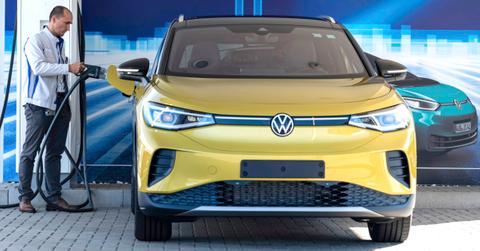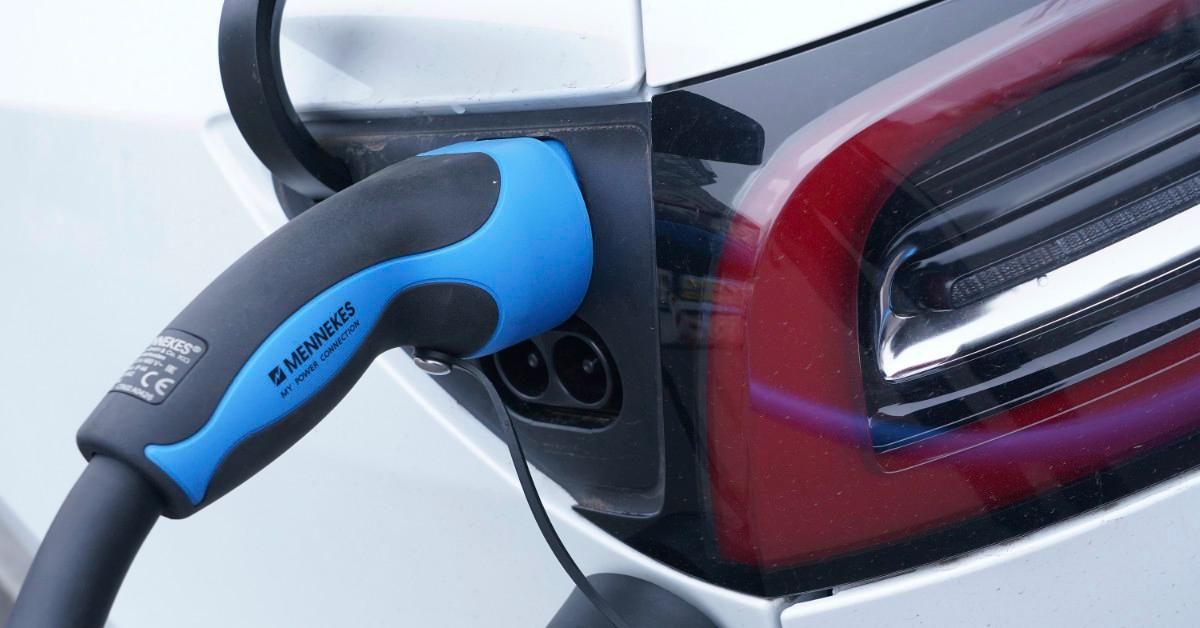How Much Does It Cost to Charge an Electric Car? Here’s the Math
How much does it cost to charge an electric car? See the kWh-per-100-miles ratings of popular EVs, and learn how to estimate the per-mile cost.
July 11 2022, Updated 10:03 p.m. ET

Gas prices continue skyrocketing among shortages and Biden sending oil overseas. Many are now considering getting an electric vehicle. But, how much does it cost to charge an EV? Is it a money saver or just a trade-in from a gas guzzler to an electricity guzzler?
The U.S. Department of Energy’s Alternative Fuels Data Center provides some quick math on this topic. “If electricity costs $0.13 per kilowatt-hour, charging an EV with a 200-mile range (assuming a fully depleted 66 kWh battery) will cost about $9 to reach a full charge,” the AFDC says on its website.
If you want to get a better sense of an EV’s cost per mile, it’s a simple calculation.

Is it worth the money? Consumer site raises value concerns.
Fox Business reported some statistics regarding the main concern buyers have when considering the switch from a gasoline car to an EV. In a survey of 8,000, 36 percent said they would heavily consider an EV as their next purchase. But, 61 percent say they are concerned about charging and 55 percent say they would need more clarity on the number of miles per charge that a car can travel. Others worry about the maintenance required for an EV.
Check your electricity bill to estimate electric car charging costs.
The first step to calculating the cost of charging an electric car at home is knowing how much you pay for each kilowatt-hour (kWh) of electricity. “Average U.S. households pay about 12 cents/kWh, but it varies widely across the country,” automotive journalist and industry analyst John Voelcker told Kelley Blue Book.
If your electric bill doesn’t list the total kilowatt-hour price, divide the bottom-line total for one month’s bill by the number of kilowatt-hours you used that month.
Then you just need to multiply that number by the electric car’s miles-per-kWh. Voelcker says that a conservative estimate is that EVs get 3–4 miles per kWh. “So divide the total miles you drive each month by 3, to get the kWh you would use monthly,” he adds. “Multiply that number by your cost per kWh. The dollar amount you get will most likely be lower than what you pay each month to buy gasoline.”
It’s usually cheaper to charge your electric car overnight at home.
More public parking spaces offer charging stations for electric cars. The charging stations might charge a fee for the recharge or the parking (or both). Dedicated fast-charging locations offer Level 2 or Level 3 charges at a premium, and some provide membership options. “Always ask before plugging in!” Voelcker advises.
Charging at home will usually be cheaper, especially overnight, Voelcker says. “While shoppers worry about access to public charging stations, they need to know that as much as 90-percent of electric-car charging is done overnight at home,” he explains. “The cheapest way to charge your electric car is almost always at home, overnight. Some utilities have special low rates for the overnight period when their demand is lightest.”
Tesla cars for example seem to cost less money when the owner charges at home. According to USA Today, it costs between $800 to $2,000 to install a home Tesla charger. Public Tesla charging stations aren't free and are charged in tiers based on the charging speed and model. For example, it costs around $0.22 per kWh at a charging station. Additionally, if an owner's car charges over its limit, the car will incur supercharger idle fees. Some EV owners say it isn't worth it.
Electric cars have a range of kWh-per-100-miles ratings.
If you want to get a more exact estimate of the cost of electric vehicle ownership, it helps to know the kilowatt-hours-per-100-miles rating of the EV you’re considering. Here are the ratings for some of Edmunds’ picks for the best electric cars of 2021 and 2022.
- Hyundai Ioniq Electric: 25 kWh / 100 mi.
- Tesla Model 3: 30 kWh / 100 mi.
- Tesla Model 3 Performance: 30 kWh / 100 mi.
- Kia Niro EV: 30 kWh / 100 mi.
- Volkswagen ID.4: 35 kWh / 100 mi.
- Porsche Taycan 4S: 42 kWh / 100 mi.
- Audi e-tron: 43 kWh / 100 mi.
The EPA has an MPGe (miles per gallon of gasoline-equivalent) standard. A car that gets 100 miles on 33.7 kWh of electricity gets a 100 MPGe score, according to U.S. News and World Report, because one gallon of gas and 33.7 kWh both generate the same amount of heat: 115,000 BTUs.
